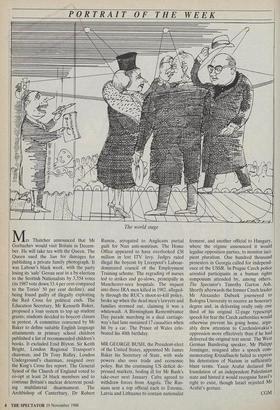PORTRAIT OF THE WEEK
The world stage Mrs Thatcher announced that Mr Gorbachev would visit Britain in Decem- ber. He will take tea with the Queen. The Queen sued the Sun for damages for publishing a private family photograph. It was Labour's black week, with the party losing its 'safe' Govan seat in a by-election to the Scottish Nationalists by 3,554 votes (its 1987 vote down 53.4 per cent compared to the Tories' 50 per cent decline), and being found guilty of illegally exploiting the Red Cross for political ends. The Education Secretary, Mr Kenneth Baker, proposed a loan system to top up student grants; students decided to boycott classes in protest. A committee convened by Mr Baker to define suitable English language attainments in primary school children published a list of recommended children's books. It excluded Enid Blyton. Sir Keith Bright, London Regional Transport's chairman, and Dr Tony Ridley, London Underground's chairman, resigned over the King's Cross fire report. The General Synod of the Church of England voted to co-opt at least 24 black members and to continue Britain's nuclear deterrent pend- ing multilateral disarmament. The Archbishop of Canterbury, Dr Robert
Runcie, arrogated to Anglicans partial guilt for Nazi anti-semitism. The Home Office appeared to have overlooked £38 million in lost ITV levy. Judges ruled illegal the boycott by Liverpool's Labour- dominated council of the Employment Training scheme. The regrading of nurses led to strikes and go-slows, principally in Manchester-area hospitals. The inquest into three IRA men killed in 1982, alleged- ly through the RUC's shoot-to-kill policy, broke up when the dead men's lawyers and families stormed out, claiming it was a whitewash. A Birmingham Remembrance Day parade marching in a dual carriage- way's fast lane sustained 17 casualties when hit by a car. The Prince of Wales cele- brated his 40th birthday.
MR GEORGE BUSH, the President-elect of the United States, appointed Mr James Baker his Secretary of State, with wide powers also over trade and economic policy. But the continuing US deficit de- pressed markets, boding ill for Mr Bush's take-over next January. Cuba agreed to withdraw forces from Angola. The Rus- sians sent a top official each to Estonia, Latvia and Lithuania to contain nationalist
ferment, and another official to Hungary, where the regime announced it would legalise opposition parties, to monitor inci- pient pluralism. One hundred thousand protesters in Georgia called for independ- ence of the USSR. In Prague Czech police arrested participants in a human rights symposium attended by, among others, The Spectator's Timothy Garton Ash. Shortly afterwards the former Czech leader Mr Alexander Dubcek journeyed to Bologna University to receive an honorary degree and, in delivering orally only one third of his original 12-page typescript speech for fear the Czech authorities would otherwise prevent his going home, argu- ably drew attention to Czechoslovakia's oppression more effectively than if he had delivered the original text uncut. The West German Bundestag speaker, Mr Philipp Jenninger, resigned after a speech com- memorating Kristallnacht failed to express his detestation of Nazism in sufficiently blunt terms. Yassir Arafat declared the foundation of an independent Palestinian state and hinted it would recognise Israel's right to exist, though Israel rejected Mr Arafat's gesture.
CGM






















































 Previous page
Previous page